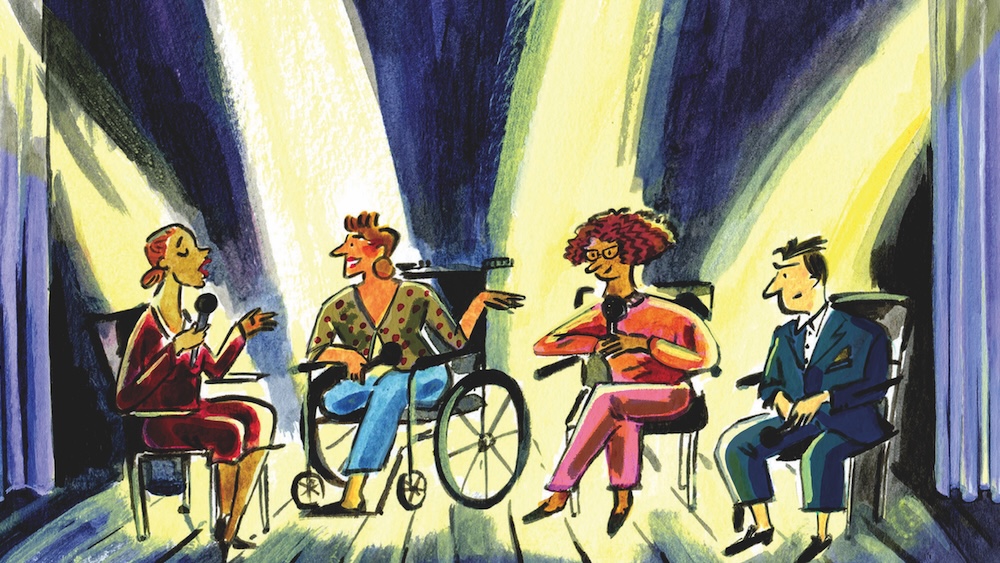


Years ago, “social justice” was the bad word “and that’s how we got to DEI,” according to consultant Jess Pettitt. (Illustration by Mokshini)
For professionals like keynote speaker, author, and consultant Jess Pettitt, CSP, the last few months have had a familiar ring. “For those of us who are doing diversity work, it feels like COVID,” she said. “We woke up one day and we can’t do our jobs.” In other years, “I would probably have close to 50 contracts by now — at least on the books,” she told Convene in June. “I have three.”
Still, Pettitt, who has long-term consulting contracts, is working. In conversations with other speakers, she’s heard stories about those who were in the middle of multi-year contracts with the federal government which just disappeared earlier this year, along with people who had been their contacts, Pettitt said. “They are no longer being paid. They have no one to email, they have no one to call. They were mid-work, and it was just gone.” And she has heard from Black speaker friends who have been told: ‘I’m not really supposed to say this, but we can’t put your face on a poster.’”
At SpeakInc., requests for DEI speakers have plummeted, said Tim Mathy, senior partner at the speakers bureau. During and after the pandemic, “we got a ton of requests for DEI speakers,” he said. “I mean, it was very hot, popular, almost a must with associations and corporations. But I’d say in the last six months or so, it’s kind of off the table.”
Mathy noted that some DEI speakers were “having to reposition themselves in a lot of ways — they’re just not getting engagements for that type of work. Some of our DEI speakers reposition themselves with kind of different language and there are others who we’ve seen just completely do a flip — a 180 on what they’re speaking about and try to become experts on a different topic, which is difficult.”
Years ago, “social justice” was the bad word “and that’s how we got to DEI,” Pettitt said. “Now that DEI is deemed bad, people are turning to ‘leadership’ and ‘workplace culture’” — terms that she also uses. “I am really leaning into crisis management.” But because she doesn’t lead with diversity language — Pettitt describes her area of expertise as talking about polarizing topics, i.e. “conversations across difference” — she hasn’t had to change very much, she said. Pettitt uses the word diversity on her website, but has removed the initials DEI, because it is such an easy target for people who are looking to harass people online by doxxing them, she said. “I’m a diversity person,” Pettitt said. “And the program I’m doing most frequently right now is the one that I did right at the beginning of COVID, which is on how did your life teach you to deal with uncertainty or the unknown?”
‘Can’t Call It a DEI Conference Anymore’
Groups who have booked DEI speakers have also changed how they talk about them, Mathy said. Some groups have renamed events with DEI in their titles, after their legal counsel “said they can’t call it a DEI conference anymore.”
Likewise, John Truran, managing director of speaker management company D’Amelio Network, said he has “definitely seen a decline in the number of DEI-specific events, such as those for Women’s History Month or Black History Month.” But at the same time, in his experience, he sees “the demand for speakers of diverse backgrounds, whether they are women, African American, Asian, or Latino, continues to be strong. In other words, most organizations are still making it a priority to showcase a diversity of talent on their main stage.”
But just not calling attention to it. Mathy cited one association group with a 90-percent female audience that had booked a speaker who focuses on women’s mental health. Their legal counsel, he said, “advised them that they had to reposition the title of the presentation to be gender neutral,” something like “‘mental health for all.’
“The speaker crushed it — she did a great job,” he said. “Honestly, I was surprised that legal got so involved with this. We work with Fortune 100 companies and from a corporate standpoint, I totally can see that happening — but the association market, I was a bit surprised to see their legal [counsel] jump in on that.”
From Pettitt’s perspective, corporations have been more likely to turn away from diversity topics than associations, but even some associations which are doubling down on diversity are doing it in way that she describes as “kind of undercover.” For one client, instead of a keynote, Pettitt was booked for a multi-part training session. “If it’s a five-part series, then it doesn’t look like a diversi ty keynote,” she said. “They don’t know the political beliefs of their members and they don’t want to upset anybody, so it’s kind of like threading the needle.”
Political discussion on stage is another area where Mathy and Pettitt see recent changes. “There was a period of time where I didn’t get this, and now I’m starting to get it again,” Pettitt said. “People say, ‘You can talk about anything you want to. We know you’re a comedian. Just don’t get political.’” Her response is: “Okay, well, everything is political. My existence is political. Are there topics that you specifically do not want me to talk about?”
After the 2016 election, demand for a once-popular format where one Democrat and one Republican would speak “really sunk,” Mathy said. “And in the last year, it’s been pretty much nonexistent. People want the geopolitical [discussion] but they really need it to be neutral, which is hard to find. It’s almost like you need a pollster rather than an opinion [leader]. It’s difficult because they want to know about the geopolitical nature of things but at the same time you can’t really give an opinion about it because that’s going to offend somebody.”
Barbara Palmer is Convene‘s deputy editor. Michelle Russell is editor in chief of Convene.








